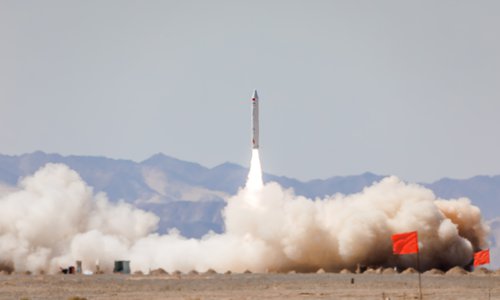China's private space sector raised plenty of money last year despite the chilly investment climate, thanks to national support for the industry and a changing environment.

Chinese private rocket firm iSpace sends a suborbital rocket into space from the Jiuquan Satellite Launch Center in Northwest China in September 2018. (Photo: Courtesy of iSpace)
In 2018, three rocket start-ups - OneSpace, LandSpace and iSpace, also known as Beijing Interstellar Glory Space Technology - held a total of eight rounds of fundraising, each raising 700 million yuan ($101.95 million) to 800 million yuan.
On Wednesday, iSpace said it had secured its A-plus financing round last September from investors led by CDH Investments, according to a statement the company sent to the Global Times.
The start-up said it plans to complete an orbital mission with its SQX-1Z rocket at the Jiuquan Satellite Launch Center, Northwest China's Gansu Province, in the first half of this year.
In 2018, both iSpace and OneSpace successfully sent their designed and produced rockets into sub-orbital space, which is significantly lower than orbital altitudes. LandSpace launched its first orbital rocket carrying a small satellite in October, but the cargo did not reach its target orbit.
Huang Zhicheng, a professor at the Beijing Institute of System Engineering, told the Global Times on Sunday that domestic private commercial rocket companies will be able to send a satellite into orbit in 2019, which will be a "major battlefield" for Chinese companies in the sector.
The industry has made great efforts since 2015 to master the necessary technology, Huang noted.
"If these companies fail to send a satellite into orbit, it will become difficult for them to get further financing; if they master this step, their future development will become smoother," said Huang.
"Also, encouraged by the successful soft landing of China's Chang'e-4 on the far side of the moon [on Thursday], more private capital will favor sectors such as space tourism and exploration," he added.
Backed by the nation's strategy of military and civilian integration since 2015, private start-ups in the commercial space sector have mushroomed, and they have showcased their abilities mainly in the rocket launch segment since the start of last year.
Nearly 100 start-ups focused on the commercial space sector were set up in the 2015-2018 period, engaged in such segments as rocket design and production, satellite design and production as well as satellite commercial use, according to media reports.
"The Chinese private commercial aerospace sector is set for more growth in 2019," Huang said.
Ma Chunfeng, general manager at Shenzhen-based Qianhai Wutong Mergers and Acquisitions Funds, told the Global Times on Sunday that in the long term, China's commercial space sector has broad opportunities and scope for growth, even though it won't yield profits in the short term.
"Different start-ups take different technology routes, but all compete for cost controls and improved efficiency," Ma said.
The industry is still exploring specific directions when commercialization is realized, for example, how and where a satellite will be used. "Venture capital investors are hoping the sector can realize commercialization, but the whole industrial chain is too long to realize it soon," Ma noted.
Ma's company invested in Beijing-based OneSpace during two rounds of funding in 2018 and he said further investment is expected this year.
"There's huge enthusiasm among a rising number of start-up entrepreneurs, who usually leave State-owned institutions after they see investments taking place. But venture capital is still very cautious, and it hasn't entered the overheating phase," said Ma.
The domestic capital market has a favorable outlook on the commercial aerospace sector, because the industry aims to develop "core technology" and advanced manufacturing, which will help drive the growth of the real economy, Huang said.
Sectors that domestic capital favored previously such as internet financing and bike-sharing providers haven't developed soundly, and capital will be more likely to focus this year on core technologies like commercial rockets, chips and 3D printing, which require both innovations of business models and technology, Huang noted.
Cover image: VCG


